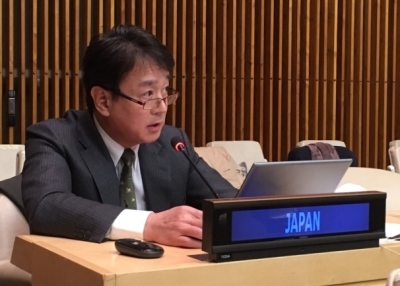平和と安全維持のための気候資金に関するアリア・フォーミュラ閣僚級会合における大菅大使ステートメント
令和4年3月9日

(As delivered)
Mr. President,
Allow me to start by thanking the United Arab Emirates for holding this important meeting.
The ultimate goal of this meeting, in my view, is to expand global solidarity to pursue the duel objectives of tackling climate change and preventing violent conflicts. The situation we witness in Ukraine is exact opposite of this. Russia must cease its aggression. Solidarity around the purposes and principles of the UN Charter must be restored immediately.
The adverse impacts of climate change threaten human security and increase the risk of violent conflict. This has become a shared recognition. Our challenge is to link the issues of climate change and conflict prevention, not on paper but in practice, and to pursue synergies of our efforts on the two fronts. Shedding light on climate finance is one good way.
Some would argue that each issue should be discussed at a most appropriate forum and not in other fora. I disagree. Because human suffering, be it climate-related or conflict-related, cannot be broken down to categories and addressed in silos. New threats to human security in the Anthropocene demand greater solidarity and “the eyes of humankind.”
I would like to touch upon two existing instruments that could be of use in linking climate finance and conflict prevention.
First, we should make full use of the Peacebuilding Commission (PBC). It was established precisely “to bring together all relevant actors to marshal resources and to advise on and propose integrated strategies” to build and sustain peace. The discussion on climate change and conflict, including the financing aspect, should be context-specific. Without identifying concrete cases of climate-conflict nexus, the discussion will just go around in circles with habitual, politicized and divisive statements.
Second, Japan underlines the importance of investing in disaster risk reduction by implementing prevention strategies. The Sendai Framework for Disaster Risk Reduction serves as the critical instrument to prevent climate impacts from causing violent conflict. Japan has helped develop disaster risk reduction plans in 80 countries from 2019 to 2020. Japan also supports capacity building as well as strengthening of early warning systems related to climate risks.
To conclude, Japan is committed to playing an active role in addressing the issues of climate change and peace, and will remain focused on making difference on the ground for those most in need.
Thank you.
